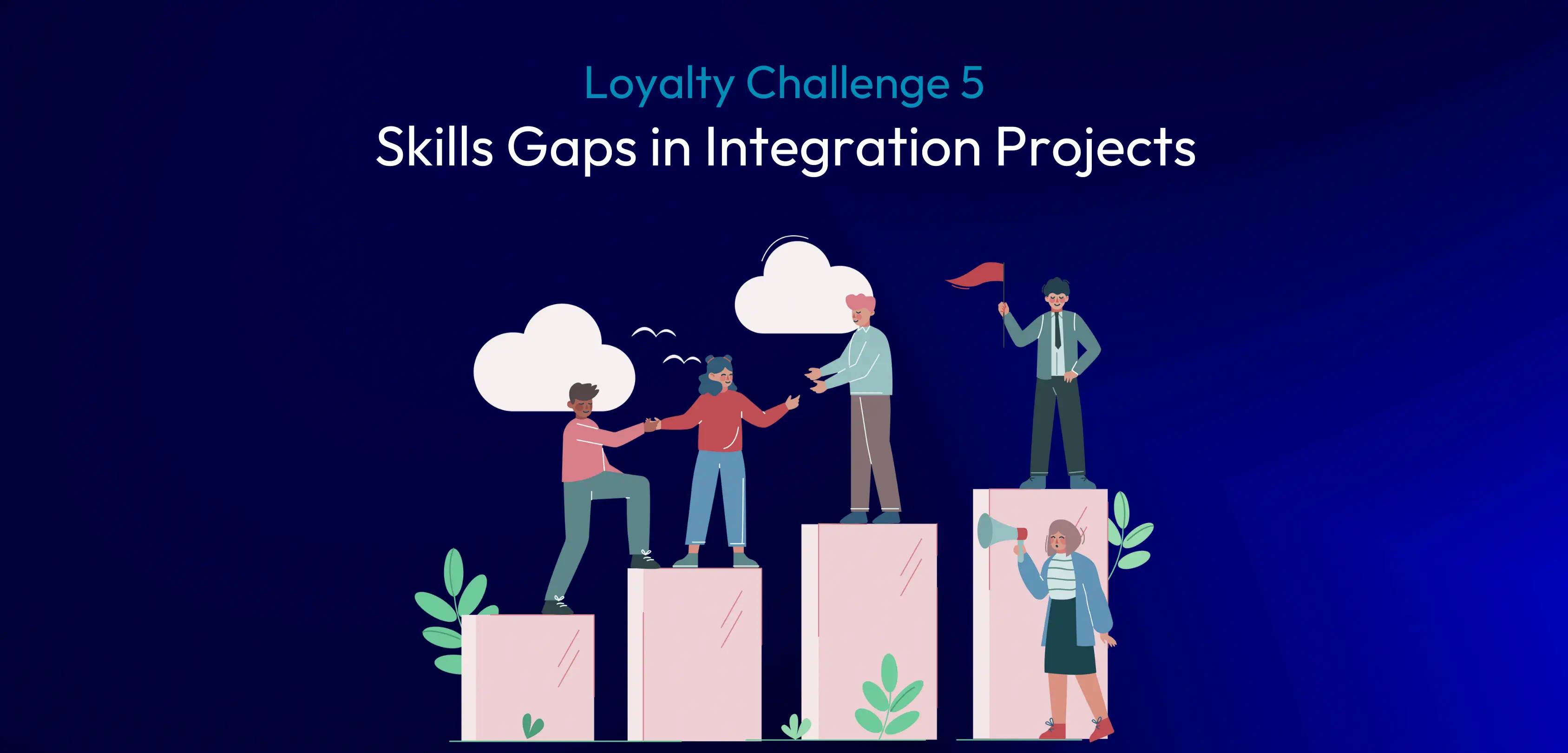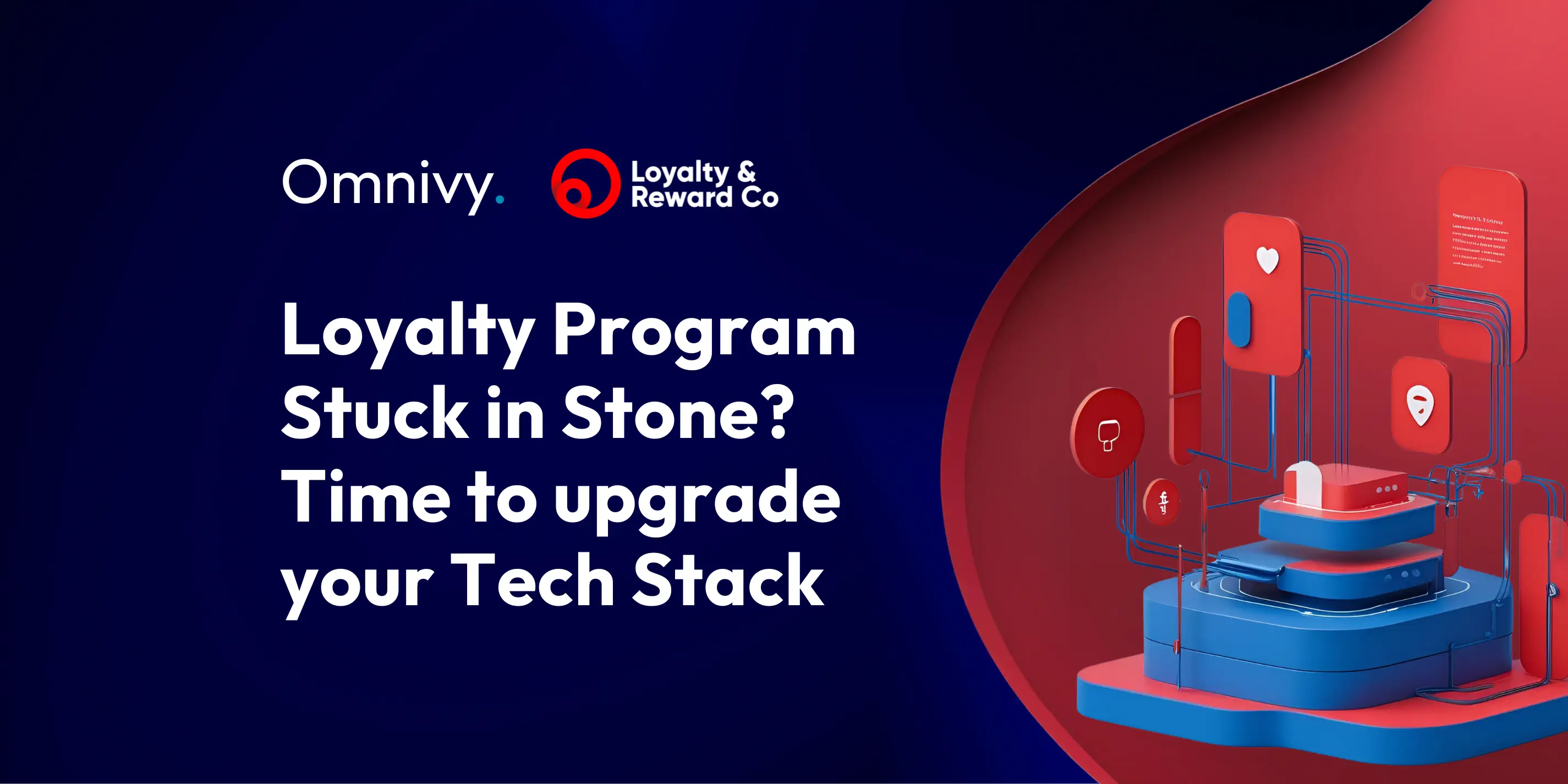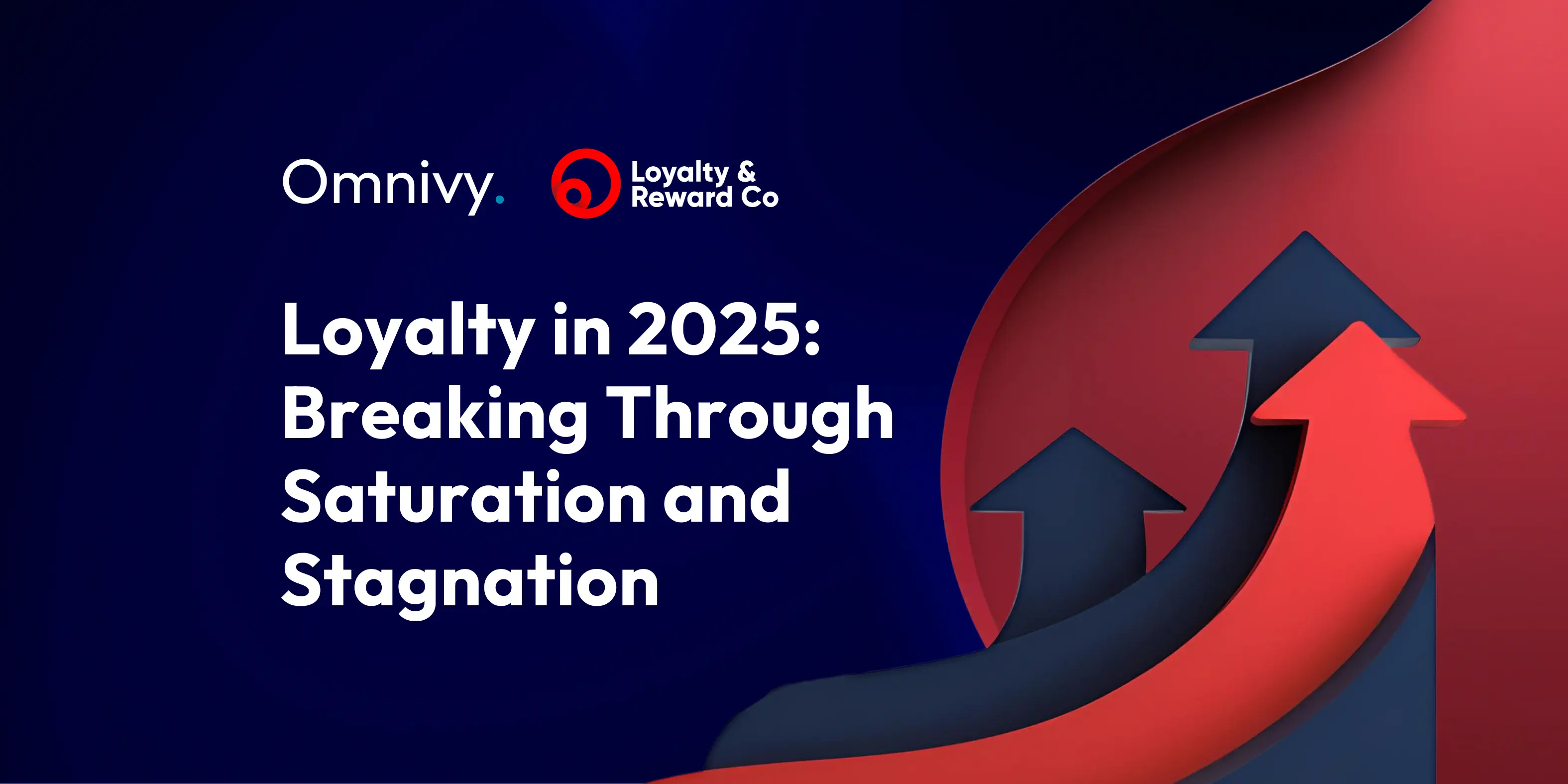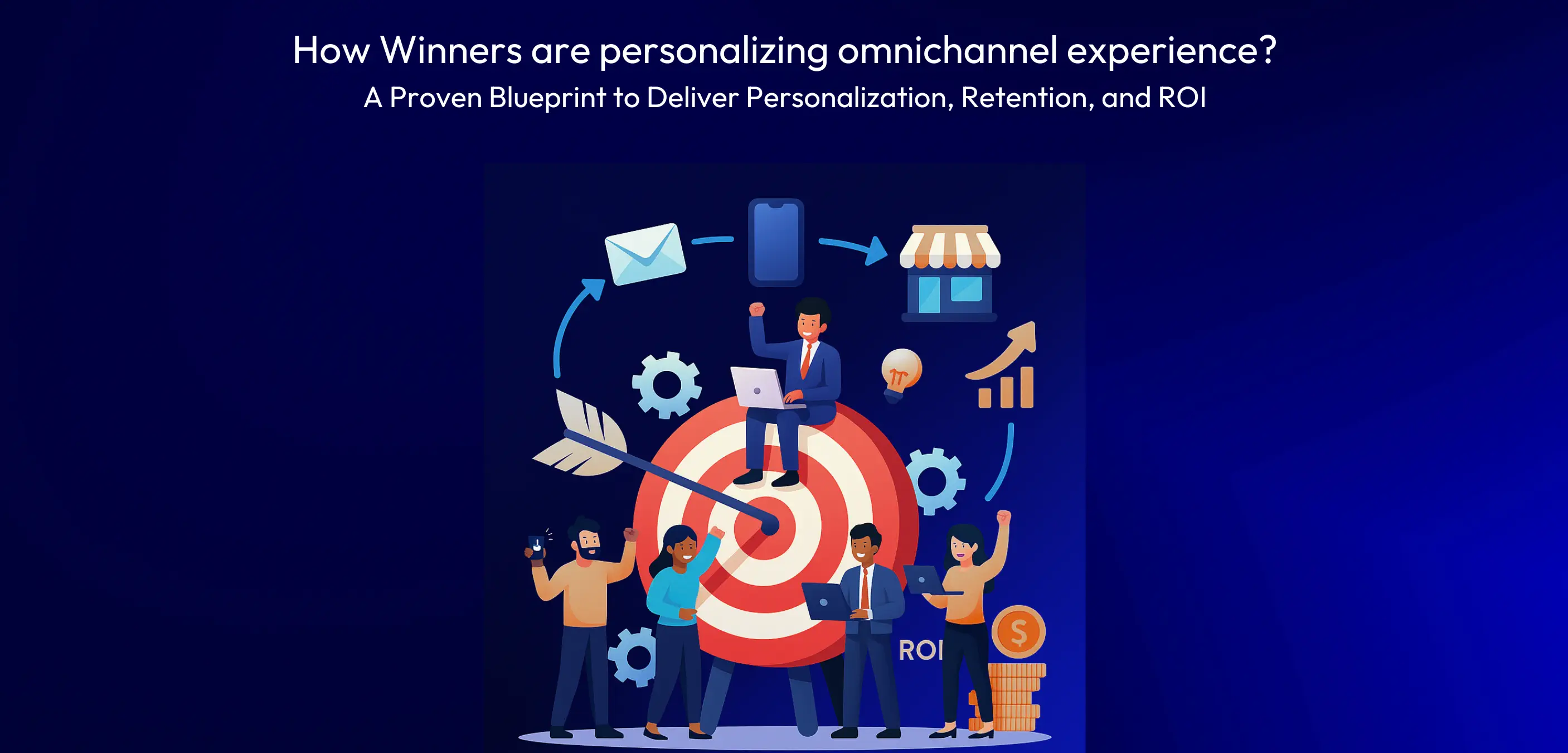A loyalty program is far more than just points and rewards—it's a complex mechanism whose success depends on the experts working behind the scenes. At its core, success relies on the ability to combine strategic, financial, operational, and technical knowledge—a mix that’s not always easily available within organizations.
Welcome to the final piece of our series exploring the top challenges in loyalty program integration. In this installment, we'll dive into perhaps the most crucial element: the skills needed to bring loyalty programs to life.
Missed the previous articles? Explore them here:
- Fragmented Customer Data: The Hidden Barrier to Loyalty Integration
- Disconnected Online and Offline Experiences: The Integration Challenge
- Lengthy Integration Timelines
- Limited Analytics and Personalization Capabilities
The Expertise Needed for Integrated Loyalty
The Loyalty Integrated Report revealed that 41% of organizations identify a lack of expertise as a major obstacle to realizing their loyalty program initiatives. This deficit often manifests as missed opportunities to leverage existing technology or a reluctance to embrace innovation because it’s perceived as too costly or disruptive to implement new processes.
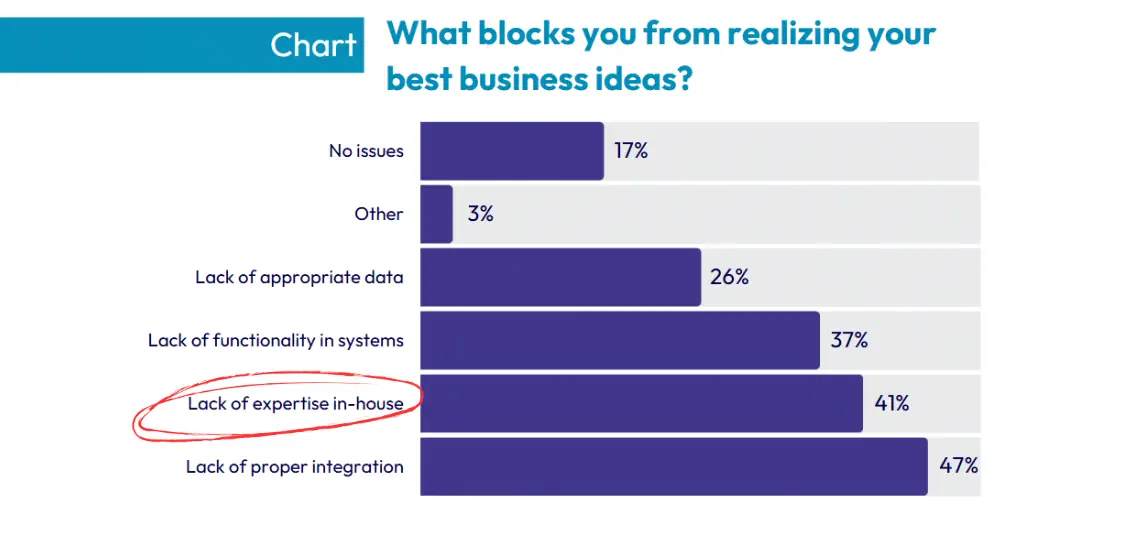
Picture building a house. You wouldn't just need an architect—you'd need electricians, plumbers, interior designers, and more. Similarly, creating a successful loyalty program demands a blend of knowledge across multiple disciplines:
- Loyalty Strategy Expertise: Organizations must set clear goals, craft compelling value propositions for customers, and create sustainable frameworks that drive engagement.
- Financial Acumen: Evaluating costs and accurately calculating the program’s return on investment (ROI) ensures its economic feasibility.
- Business Process Understanding: Ensuring smooth operations and the effective management of loyalty mechanics is crucial for program success.
- Technical Expertise: From mastering APIs to ensuring system compatibility and managing efficient data flow, technical skills are essential to a program’s success.
Without these competencies, organizations risk delays, inefficiencies, and the inability to unlock their program’s maximum value and impact. It might seem like a lot, but this is just the beginning.
At the heart of every successful loyalty program lies a deep understanding of customer behavior. As we explored in our previous article on Limited Analytics and Personalization, this insight is absolutely crucial. Don't have all the customer data you need? Start with industry benchmarks and case studies from your sector—they can be valuable stepping stones while you build your own customer intelligence.
Additional challenges you might face include:
- Strategic Collaboration Across Functions: Business and IT teams must work together from the outset, sharing a unified vision. For example, loyalty mechanics developed by business teams should align seamlessly with IT’s scalability plans to avoid conflicts.
- Technical vs. Business Language: Business teams may struggle to articulate their needs in technical terms, while IT teams may not fully understand the business impact of their technical decisions. This communication gap can lead to delays, misaligned expectations, or incomplete integrations.
- Different Priorities: Business teams focus on designing innovative loyalty mechanics and delivering immediate value to customers. IT teams prioritize system stability, scalability, and long-term infrastructure planning. These differing goals can result in a lack of shared vision.
- Reactive Problem-Solving: Without early collaboration, IT teams are often brought into the process too late. By the time technical challenges arise, budgets and timelines are already strained, further complicating the project.
You might be wondering:
"What if we need to launch now but don't have all the expertise in-house?"
"How do we bridge the gap between our business visionaries and technical experts?"
"Can we really afford to wait until we have all the perfect pieces in place?"
These aren't just hypothetical questions—they're the real challenges that keep program managers up at night. The scope of what's needed can feel overwhelming: deep customer insights, technical prowess, business strategy, and the ability to make all these pieces work together seamlessly.
Overcoming the Challenges: The Path Forward
Let's explore strategies that are transforming the way businesses approach loyalty program integration.
Successful cross-functional collaboration starts with establishing integrated project teams early in the program development process. Rather than operating in silos, business and IT professionals should work side by side from day one, sharing insights and building mutual understanding. This collaborative approach enables teams to identify potential challenges early and develop solutions that balance technical feasibility with business objectives. When marketing teams understand basic technical constraints and IT teams grasp the business impact of their decisions, the entire project benefits from increased efficiency and better outcomes.
Investment in specialized expertise plays a crucial role in program success. Organizations that bring in loyalty experts gain access to valuable industry insights and best practices. These specialists bring proven methodologies for program design and implementation, helping organizations avoid common pitfalls while accelerating the path to success. Their experience across multiple implementations enables them to anticipate challenges and propose effective solutions before problems arise.
Modern integration tools have emerged as powerful assets in addressing the skills gap. Solutions like Omnivy’s loyalty integration accelerator provide pre-built connectors and standardized frameworks that significantly reduce the technical expertise required for successful implementation. These tools not only accelerate development timelines but also ensure consistent quality across different aspects of the program.
The Role of Loyalty-Specialized Integrators
While in-house teams may be proficient in their respective areas, they often lack the deep technical knowledge and experience needed to effectively integrate a sophisticated loyalty system into an existing ecosystem. This is where partnering with loyalty-specialized integrators can offer substantial advantages.
Loyalty-specialized integrators bring a wealth of industry-specific knowledge that can be crucial for the success of the integration process. Their expertise spans various loyalty engines and integration challenges, giving them a unique understanding of how different systems—such as CRM, marketing automation, e-commerce platforms, and POS systems—interact and complement one another. This deep knowledge of the loyalty landscape allows them to apply best practices and avoid common pitfalls that can otherwise cause delays, inefficiencies, and budget overruns.
For businesses that are unfamiliar with the intricacies of loyalty systems, an experienced integrator becomes a trusted advisor, ensuring the right solutions are chosen and implemented in alignment with business goals. These professionals also stay up-to-date with the latest trends, innovations, and regulations, which helps in designing a loyalty program that remains competitive and compliant.
- Reducing Project Timelines - Loyalty-specialized integrators have the technical expertise and experience to navigate this complexity quickly. They understand the typical integration pain points and have established workflows and templates to ensure faster execution. Their familiarity with common integration hurdles, such as data mapping, system compatibility, and API configurations, allows them to address issues proactively and keep the project moving forward without unnecessary delays. This can be particularly valuable for businesses looking to achieve "quick wins" and deliver early value to stakeholders, thereby building momentum for the rest of the integration.
- Improving the Overall Quality of the Integration - Beyond speed, partnering with loyalty-specialized integrators improves the overall quality of the system integration. Integrating a loyalty engine isn’t just about connecting the technology—it’s about ensuring that the system is designed to work seamlessly with the business’s objectives, processes, and customer journey. Loyalty experts understand the nuances of customer behavior, reward mechanics, and how to align these with the broader marketing and sales strategy. Moreover, these specialists are skilled in troubleshooting issues that may not be immediately apparent, such as data discrepancies or integration conflicts that could negatively impact the user experience. Their experience allows them to optimize the system for efficiency, scalability, and future-proofing, ensuring that it can evolve as business needs change over time. This leads to higher-quality integrations that not only meet current expectations but are also capable of adapting to new technologies and business models.
- Fostering Stronger Collaboration Between Business and IT Team - Loyalty-specialized integrators act as a bridge between business and IT. By translating business goals into clear, actionable technical requirements, they help both sides understand each other's perspectives. This collaboration ensures that the integration is designed to meet business needs while also being technically feasible. As a result, IT teams can focus on executing the integration with a clear understanding of the desired outcomes, while business teams can rest assured that their goals are being met without needing to get mired in technical details.
- Long-Term Support and Optimization - Even after the initial integration is completed, the work is far from over. Loyalty systems require continuous optimization to ensure they remain effective and aligned with evolving business objectives. Loyalty-specialized integrators provide ongoing support to help businesses refine their loyalty programs, troubleshoot issues, and implement new features as the system matures.
This long-term partnership ensures that businesses can continue to leverage the full potential of their loyalty system, adapting it as customer expectations and market conditions change. Moreover, with ongoing expert support, companies can experiment with new loyalty strategies, such as AI-driven personalization or advanced reward structures, with the confidence that they have the right expertise guiding their efforts.
Conclusion
A successful loyalty program integration isn't a destination—it's a journey. By combining strategic collaboration, specialized expertise, and the right technology, organizations can create programs that don't just work today but evolve with changing customer needs and market dynamics.
Remember: The goal isn't just to launch a loyalty program—it's to create a living, breathing system that grows stronger over time. With the right partners and approach, you're not just bridging the skills gap—you’re building a foundation for long-term success.
